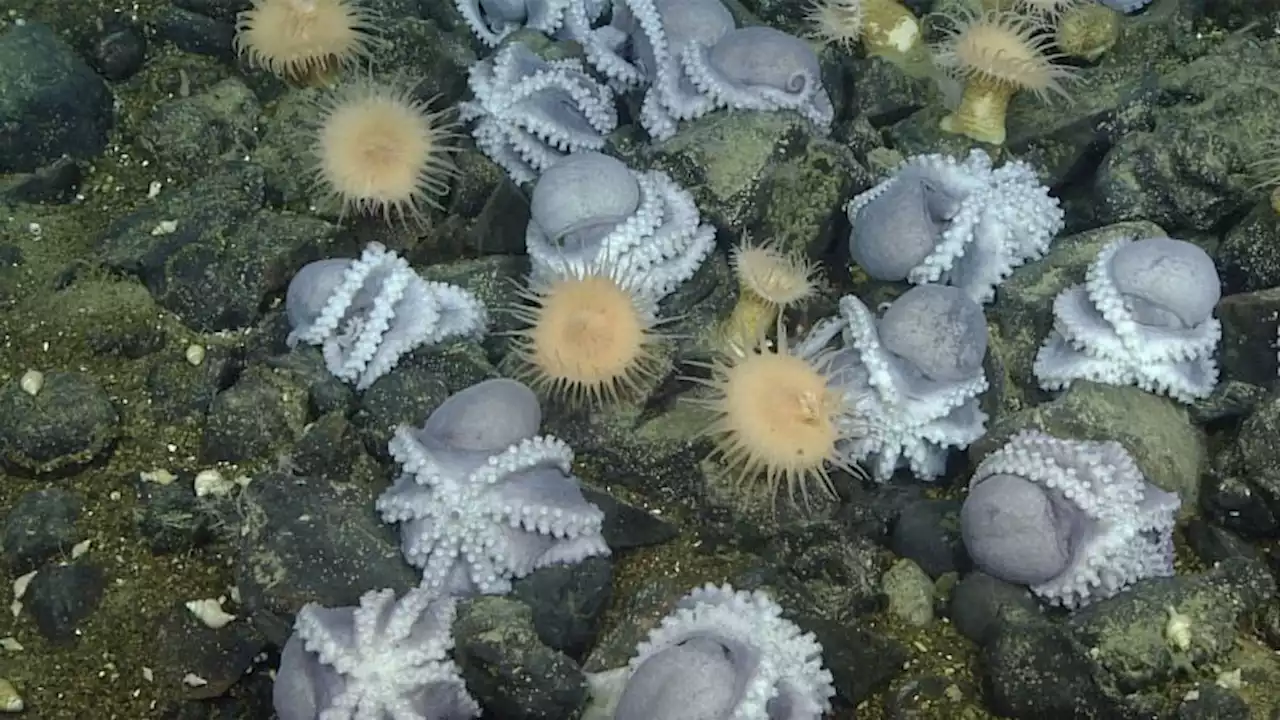Researchers believe the shorter brooding period near warm hydrothermal vents increases a hatchling octopus’ odds for survival.
Deep-sea octopuses are typically solitary creatures that inhabit frigid waters in one of Earth’s most challenging environments. The 2018 discovery of thousands of the eight-legged cephalopods about 2 miles below the ocean’s surface flummoxed and fascinated marine scientists in equal measure.
The remotely operated submersible also left a time-lapse camera and sensors to measure temperature and oxygen levels for long-term observations of the octopuses’ behavior. The camera recorded an image every 20 minutes, taking about 12,200 images from March 2022 to August 2022. Faster brood times in the octopus garden With this information, scientists pieced together why the octopus are attracted to the site.
United States Latest News, United States Headlines
Similar News:You can also read news stories similar to this one that we have collected from other news sources.
 Scientists solve the genetic puzzle of sex-related Y chromosomeScientists have taken an important step forward in understanding the human genome - our genetic blueprint - by fully deciphering the enigmatic Y chromosome present in males, an achievement that could help guide research on infertility in men.
Scientists solve the genetic puzzle of sex-related Y chromosomeScientists have taken an important step forward in understanding the human genome - our genetic blueprint - by fully deciphering the enigmatic Y chromosome present in males, an achievement that could help guide research on infertility in men.
Read more »
 Researchers publish new results from dark boson searchesLocated at CERN's North Area and receiving beams from the Super Proton Synchrotron (SPS), the NA64 and NA62 experiments search for dark matter, complementing searches at the LHC, as they cover a different energy range. Both experiments have recently published new results. The research is published on the arXiv preprint server.
Researchers publish new results from dark boson searchesLocated at CERN's North Area and receiving beams from the Super Proton Synchrotron (SPS), the NA64 and NA62 experiments search for dark matter, complementing searches at the LHC, as they cover a different energy range. Both experiments have recently published new results. The research is published on the arXiv preprint server.
Read more »
 Rise in toxic algae blooms requires coordinated response, say researchersThe prevalence of blue-green algae blooms in southern Ontario will become more frequent as temperatures rise, say Brock University researchers.
Rise in toxic algae blooms requires coordinated response, say researchersThe prevalence of blue-green algae blooms in southern Ontario will become more frequent as temperatures rise, say Brock University researchers.
Read more »
 Researchers find 20,000-year-old refugium for orcas in the northern PacificThe northern Pacific near Japan and Russia is home for several different groups of orcas. They have no contact with each other, do not seek the same food, do not speak the same dialect, and do not mate with each other. How can this be when they live so close to each other and belong to the same species?
Researchers find 20,000-year-old refugium for orcas in the northern PacificThe northern Pacific near Japan and Russia is home for several different groups of orcas. They have no contact with each other, do not seek the same food, do not speak the same dialect, and do not mate with each other. How can this be when they live so close to each other and belong to the same species?
Read more »
 Researchers extracted a Pink Floyd song from a person’s brain - listen to the haunting audioNew research shows that scientists were able to extract brain waves and reconstruct music from them and its absolutely haunting.
Researchers extracted a Pink Floyd song from a person’s brain - listen to the haunting audioNew research shows that scientists were able to extract brain waves and reconstruct music from them and its absolutely haunting.
Read more »
 'Rare' fish endangered in two US states has researchers working to save species from extinctionResearchers at Pennsylvania State University are working with local wildlife agencies to boost Chesapeake logperch populations to prevent the fish from becoming federally endangered.
'Rare' fish endangered in two US states has researchers working to save species from extinctionResearchers at Pennsylvania State University are working with local wildlife agencies to boost Chesapeake logperch populations to prevent the fish from becoming federally endangered.
Read more »
